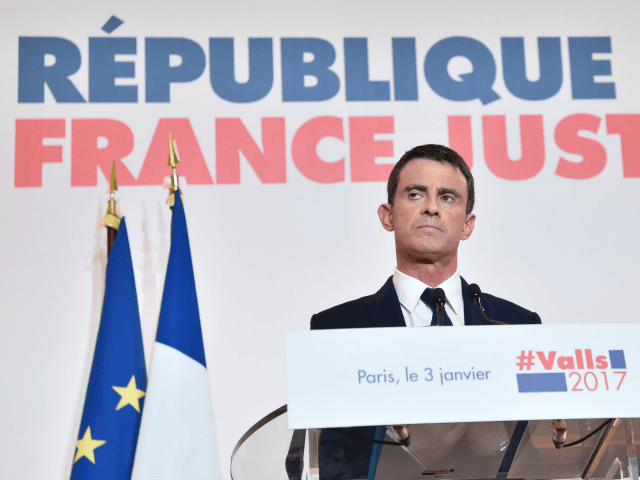(AFP) – French Socialist presidential candidate Manuel Valls sought to re-energise the beleaguered Left on Tuesday, as he set out his programme to clinch his party’s presidential nomination for elections this year.
The former premier is one of seven contenders for the Socialist nomination in this year’s two-round presidential election in April and May. The winner will be picked in a two-round primary on January 22 and 29.
But polls suggest whoever wins the Socialist ticket will not make it into the presidential run-off, expected to pit conservative Francois Fillon against far-right Front National leader Marine Le Pen.
On Tuesday Valls and rival Vincent Peillon, a former education minister, offered contrasting visions of France’s place in Europe, with the ex-premier vowing to defend hard-up voters who feel “robbed of their destiny”.
Valls, 54, threw his hat in the ring for president after Francois Hollande announced he would not seek a second term after a turbulent four years marked by terror attacks, labour protests and a deep economic malaise.
Hollande’s tenure was also marred by severe infighting within the Socialist Party (PS), between the centre-left leadership and die-hard leftists.
“This time the PS is fighting for its survival,” Le Parisien daily wrote in a front-page headline Tuesday.
“The question is not whether the left can win. The left must win,” said Valls, calling himself the candidate of a “strong Republic and a just France.”
– Valls record a millstone –
But his record in government risks being a millstone.
His rivals have made much of his failure to significantly dent unemployment and use of decrees to ride roughshod over Socialist opposition to contested reforms.
Two of his primary opponents — former economy minister Arnaud Montebourg and former education minister Benoit Hamon — quit his government in protest over what they saw as its betrayal of leftist ideals.
“I take full responsibility for what we put in place,” Valls said of his stint under Hollande.
But he also attempted to put some distance between himself and the most unpopular president in France’s post-war history.
If elected, he said, he would push for a conference among like-minded EU leaders to discuss the bloc’s “reorganization”.
He also vowed to defend French sovereignty and called for Turkish membership of the EU to be definitively taken off the cards.
– ‘European New Deal’ –
Peillon, a 56-year-old Hollande loyalist, came out in defence of Brussels.
Calling for a “European New Deal” led by France and Germany he said “Europe was built by the transfer of sovereignty” from member states and that the process should not be unravelled.
The Socialist primary risks paling in comparison to November’s rightwing nominating contest.
Over four million people voted in that contest, which Nicolas Sarkozy’s conservative former prime minister Francois Fillon won by a landslide.
The Socialists say they are expecting only half as many to turn out to pick their nominee.
Polls show the winner crashing out in the first round of the election in April, lagging far behind Fillon and far-right leader Le Pen.
Reform-minded, ex-economy minister Emmanuel Macron and Communist-backed firebrand Jean-Luc Melenchon, two candidates running outside the primary system, provide further competition on the centre and left.
– Le Pen funding gap –
Fillon and Le Pen are tipped to make it through to the presidential run-off in May, with Fillon ultimately emerging victorious.
But no-one is ruling out Le Pen, whose anti-immigrant, anti-establishment message has found fertile ground among voters disillusioned with mainstream politics.
On Tuesday, she accused French banks of trying to thwart her campaign, saying she was having difficulty securing loans towards her presidential bid.
“I’m 6 million euros short,” she told BFM-TV news channel, saying she suspected a “political” decision on behalf of the lenders.
Fillon, a self-avowed admirer of Margaret Thatcher, meanwhile rejected criticism that his programme of steep spending cuts would worsen the lot of the poor.
“The main cause of poverty is unemployment and that’s the reason I have a radical economic programme,” he said.

COMMENTS
Please let us know if you're having issues with commenting.